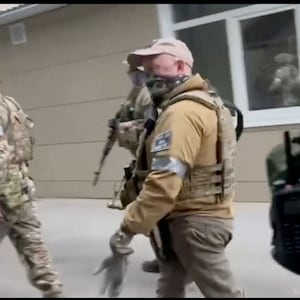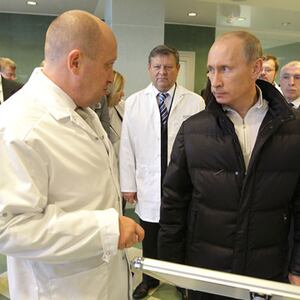Yevgeny Prigozhin, the longtime Vladimir Putin ally-turned-mercenary boss who staged a violent uprising last month, offered his subordinates a blunt explanation for his decision to turn on the Russian military: “I went crazy.”
That’s according to a new report by the investigative outlet The Project, which on Wednesday released what it called a “criminal and psychological portrait” of the Kremlin’s longtime enforcer.
Nearly three weeks after Prigozhin’s armed mutiny sent members of the Russian elite scrambling for their private jets, questions remain about whether it was an act staged by a lone madman with too much power—or a carefully planned revolt that had the backing of some within Putin’s inner circle. While U.S. intelligence has pointed to the latter, the Kremlin’s mouthpieces have settled on a version more convenient to Putin, whereby the president’s personal attack dog simply spiraled out of control. That version has allowed the Kremlin to sideline Prigozhin just as he was beginning to gain more popular support, even appearing in political posters in some regions that called for the Wagner boss to replace Putin.
Former employees of Prigozhin told The Project he was indeed known for violent outbursts and seemed to delight in dishing out cruelty to subordinates.
“If he was dissatisfied with something, he could easily lead you out into the corridor, push you, and you would go flying down the stairs,” one source was quoted as saying.
Another insider told the publication the ex-con-turned-Putin-confidant had a habit of driving employees away with his unprovoked violence: “One time Prigozhin was in a hurry and, disgruntled, he kicked his chauffeur in the head from the back seat, and said something like ‘Let’s go faster!’”
The driver subsequently quit.
Prigozhin is also said to have outsourced violent beatings to a man dubbed “The Teacher,” a personal henchman of sorts who savagely attacked employees who’d fallen out of favor with the boss.
“This is the executioner who fucks you up in the basement, and sends [Prigozhin] a photo [so he can] decide whether to add more blows or if the beating was enough,” Vyacheslav Tarasov, a former employee, said in a video message on the day of the mutiny.
A separate source told The Project that a colleague had once vanished after slipping up at a work meeting. He returned a few weeks later, telling colleagues he’d spent several days in the basement enduring beatings. As proof, he showed off bruises all over his body.
Among the other revelations in the report is Prigozhin’s apparent terror of contracting COVID, likely because he’d undergone treatment for stomach cancer, though it was not clear when.
“He had cancer. Now the formation of tumors seems to have stopped,” one unnamed source said.
A framed photo of decapitated heads found in Prigozhin’s home during a raid after his mutiny was also published uncensored for the first time, showing the bloody remains of seven African men laid out on concrete, one of them still wearing a hat and sunglasses.
Lest anyone think Putin didn’t know who he was dealing with all this time, the report also includes anecdotes of the Russian leader’s interactions with Prigozhin dating back to the late 1990s.
By late 2011, when then-Prime Minister Putin had announced plans to return to the presidency, the two already enjoyed a cozy relationship, with Putin lighting up as he passed Prigozhin in the halls of St. Petersburg’s Konstantinovsky Palace and joking “great haircut” before shaking the bald would-be Wagner boss’ hand.
Putin is said to have spent his time chatting with Prigozhin, calling him “Zhen,” while other heads of state sat at the table waiting for their dinner.








